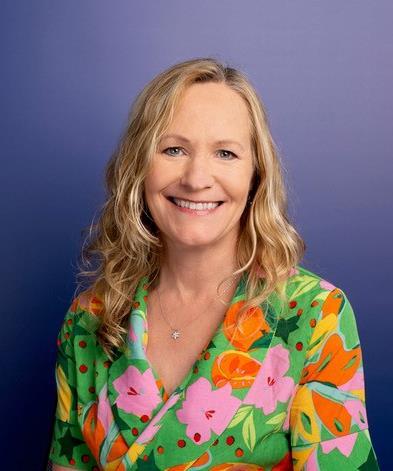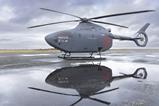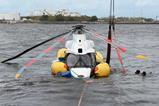By her own admission, Jacqui Sutton’s path into aerospace was an unconventional one. Starting out with a degree in Russian studies – encompassing literature, language and culture, and a year-long placement in the USSR – she nonetheless forged a career with some of the biggest names in aerospace engineering, latterly as chief customer officer for UK propulsion specialist Rolls-Royce, a role she held from 2019 until 2021, the end of her 13-year stint with the firm.
She now holds non-executive director posts at Farnborough International – the organiser of the biennial UK air show – and the Women in Aviation & Aerospace Charter.
Sutton says her motivation to take up the latter role was in part shaped by her route into the industry.
“Since stepping back from full-time corporate life, I’ve been trying to find ways to give back to the industry but also encourage more people who wouldn’t necessarily think about aerospace to consider joining,” she says, “because my path is pretty atypical in that I didn’t come through an engineering route.”

Having graduated “without a clue” about her next step, Sutton eventually decided another qualification was necessary and embarked on a post-graduate diploma in international marketing, an element of which was a research project for a business.
“I was interested in industrial marketing, partly because of my experience in the Soviet Union,” she says.
What she means is that the alternative path would have been marketing fast-moving consumer goods “and morally I didn’t want to be the person that would go around and try to convince Russian grannies to buy a certain brand of soap powder”.
In the end, she was sponsored by a non-aerospace engineering company in the UK “to find new markets for their equipment” among the newly-open Eastern Bloc nations.
But for all their new-found embrace of capitalism, Eastern Europe was not like other markets; the years of Communism and faltering centrally-planned economies meant that people and businesses were forced to adapt – they learned that the state would not always provide and in order to obtain the basics of life or business, they had to bend the rules and work in the dark spaces ignored by the authorities.
It was Sutton’s understanding of the way those markets worked, derived from a year in Voronezh, and the mindset of the population – which gave her an edge.
In her view, people in Eastern European countries were not used to doing business “in the way that we would understand it in the West”.
NEW OPPORTUNITIES
Boiled down, it was a matter of trust – concepts like standing by your word were “still quite alien”, she says. This was combined with a short-term mentality driven by the nagging fear that the Iron Curtain could be raised again just as rapidly as it had come down: “People thought that they needed to make money really quickly in case all these opportunities were taken away from them again.
“This was where I could see the benefit of my cultural awareness – my understanding of where they were coming from was much more developed than my UK peers.”
However, working in post-Communist Eastern Europe was not without its challenges, or even risks: “Some of those business trips, solo business trips, were pretty scary at the time; I used to eat my meals in my hotel room because you’d get no peace sitting in a restaurant on your own.”
After three years in this role, Sutton made the leap into aerospace, joining the aircraft transparancies division of glass manufacturer Pilkington Group. Again, her degree was the way in: the company needed a Russian speaker because it had done a deal with a research institute in the country related to a proprietary technique for toughening glass.
“And that was another kind of ‘aha!’ moment. In the interview I asked them what kind of contract they had in place with this Russian organisation – it turned out they had been rather naive – but it was a moment of realisation that that time spent among a nation helps you learn a lot of useful skills.”
A move to avionics and flight display systems with Smiths Industries followed. But as time went on and it became apparent that the aerospace unit was being prepared for a sale, Sutton says she was “starting to get a bit disillusioned with the whole world of big corporates – when I looked upwards I didn’t like what I saw: it seemed to be a very share-price-chasing, financially focussed leadership team.”
FAITH RESTORED
But while the business itself was in “some sort of limbo”, Sutton found herself selected for a management programme that sought to “encourage more women into senior roles”. That saw her assigned a mentor from another UK-listed business – in this case former Unilever boss Niall FitzGerald. “He was just fantastic,” she says. “He restored my faith that you can have FTSE 100 businesses that are run by decent people.”
In 2007, what had by then become Smiths Group sold its aerospace unit to GE Aviation, giving Sutton the chance to rise through a new business. But R-R was also recruiting, posing her a dilemma.
She recognised that to be “in the heart of a business, you needed to be in the country where the decisions were made”. To achieve that with GE would have meant a move to Cincinnati in the USA. “I had personal reasons at the time to stay in the UK but also I wanted to help UK engineering and the UK aerospace industry continue on its successful path. And that’s what Rolls-Royce offered: to be part of UK Plc.”
Having settled on a move to the Derby firm, Sutton was initially responsible for looking after European airline customers, then those in the Americas, before moving to Toulouse for three years to manage R-R’s relationship with Airbus.
But given her non-engineering background and an entirely transferable skillset, what has kept her in the aerospace industry for so long? “It may have been my brother that made the Airfix planes when we were kids, but this industry gradually just grabs you.
“There’s a massive thrill every time you are at an air show and you watch whatever the latest technology is on show. Even at an airport I’ve turned into an unrepentant plane spotter,” she admits.
After 13 years at the engine maker – and faced with the profound challenges posed by the Covid-19 pandemic – Sutton decided she needed to take a step back. “I wanted to spend my time encouraging others, to give back to the industry, and I couldn’t do that in an all-consuming, 24/7 role,” she says.
Although Sutton sees “pockets” of progress on addressing the gender imbalance, it is, she says, “frustrating that we are still talking about [the issue] in 2023”.
Change will be a top-down process, she argues, when business leaders treat diversity as something other than a “specialist subject that just the women talk about”.
“I think there is still room for improvement if I’m honest. Because if I look at the top tables around the industry there are still not enough women in positions to be driving change.”































